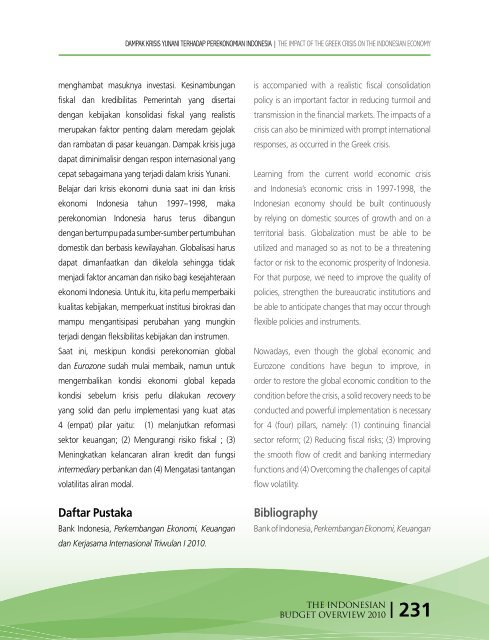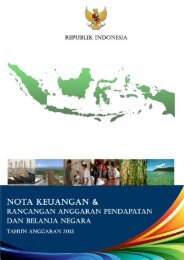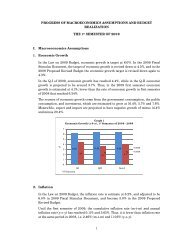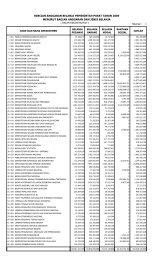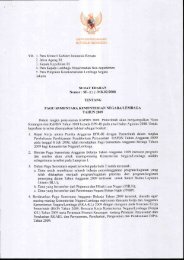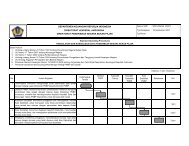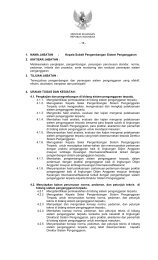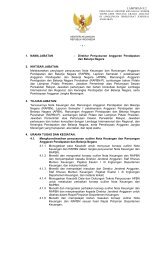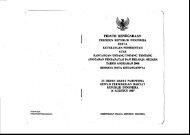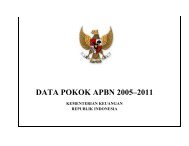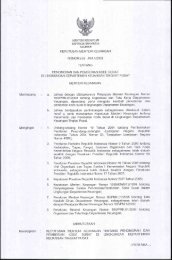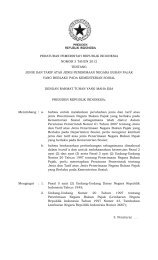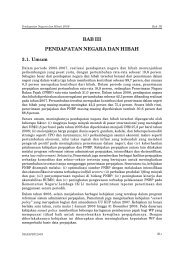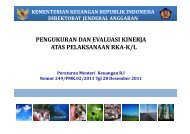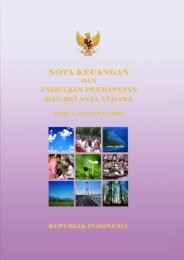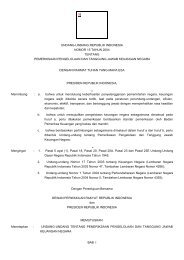The Indonesian Budget Overview 2010 - Direktorat Jenderal ...
The Indonesian Budget Overview 2010 - Direktorat Jenderal ...
The Indonesian Budget Overview 2010 - Direktorat Jenderal ...
- No tags were found...
You also want an ePaper? Increase the reach of your titles
YUMPU automatically turns print PDFs into web optimized ePapers that Google loves.
DAMPAK KRISIS YUNANI TERHADAP PEREKONOMIAN INDONESIA | THE IMPACT OF THE GREEK CRISIS ON THE INDONESIAN ECONOMYmenghambat masuknya investasi. Kesinambunganfiskal dan kredibilitas Pemerintah yang disertaidengan kebijakan konsolidasi fiskal yang realistismerupakan faktor penting dalam meredam gejolakdan rambatan di pasar keuangan. Dampak krisis jugadapat diminimalisir dengan respon internasional yangcepat sebagaimana yang terjadi dalam krisis Yunani.Belajar dari krisis ekonomi dunia saat ini dan krisisekonomi Indonesia tahun 1997–1998, makaperekonomian Indonesia harus terus dibangundengan bertumpu pada sumber-sumber pertumbuhandomestik dan berbasis kewilayahan. Globalisasi harusdapat dimanfaatkan dan dikelola sehingga tidakmenjadi faktor ancaman dan risiko bagi kesejahteraanekonomi Indonesia. Untuk itu, kita perlu memperbaikikualitas kebijakan, memperkuat institusi birokrasi danmampu mengantisipasi perubahan yang mungkinterjadi dengan fleksibilitas kebijakan dan instrumen.Saat ini, meskipun kondisi perekonomian globaldan Eurozone sudah mulai membaik, namun untukmengembalikan kondisi ekonomi global kepadakondisi sebelum krisis perlu dilakukan recoveryyang solid dan perlu implementasi yang kuat atas4 (empat) pilar yaitu: (1) melanjutkan reformasisektor keuangan; (2) Mengurangi risiko fiskal ; (3)Meningkatkan kelancaran aliran kredit dan fungsiintermediary perbankan dan (4) Mengatasi tantanganvolatilitas aliran modal.Daftar PustakaBank Indonesia, Perkembangan Ekonomi, Keuangandan Kerjasama Internasional Triwulan I <strong>2010</strong>.is accompanied with a realistic fiscal consolidationpolicy is an important factor in reducing turmoil andtransmission in the financial markets. <strong>The</strong> impacts of acrisis can also be minimized with prompt internationalresponses, as occurred in the Greek crisis.Learning from the current world economic crisisand Indonesia’s economic crisis in 1997-1998, the<strong>Indonesian</strong> economy should be built continuouslyby relying on domestic sources of growth and on aterritorial basis. Globalization must be able to beutilized and managed so as not to be a threateningfactor or risk to the economic prosperity of Indonesia.For that purpose, we need to improve the quality ofpolicies, strengthen the bureaucratic institutions andbe able to anticipate changes that may occur throughflexible policies and instruments.Nowadays, even though the global economic andEurozone conditions have begun to improve, inorder to restore the global economic condition to thecondition before the crisis, a solid recovery needs to beconducted and powerful implementation is necessaryfor 4 (four) pillars, namely: (1) continuing financialsector reform; (2) Reducing fiscal risks; (3) Improvingthe smooth flow of credit and banking intermediaryfunctions and (4) Overcoming the challenges of capitalflow volatility.BibliographyBank of Indonesia, Perkembangan Ekonomi, KeuanganTHE INDONESIANBUDGET OVERVIEW <strong>2010</strong>231


